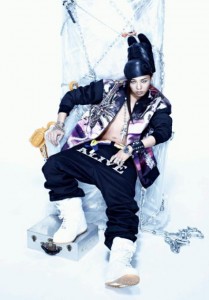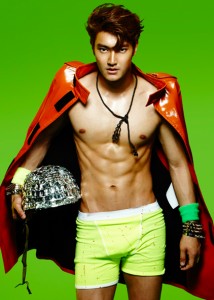 Over the past week or so, I have been inundated with so much Big Bang news — concept pictures, track lists and what not — that I feel like the objective of their marketing effort is information overload instead of building up genuine excitement for their music. And don’t get me wrong, this site is also to blame for the hype surrounding Big Bang and every other K-pop group that “debuts” or “comes back.”
Over the past week or so, I have been inundated with so much Big Bang news — concept pictures, track lists and what not — that I feel like the objective of their marketing effort is information overload instead of building up genuine excitement for their music. And don’t get me wrong, this site is also to blame for the hype surrounding Big Bang and every other K-pop group that “debuts” or “comes back.”
For instance, EXO teasers have become a joke after the fifth one — do we really need 36 teasers before debuting a group? I get that there are at least 12 boys to promote through these teasers, but nothing in excess is ever a good thing. And I also get it, teasers are a great way to generate interest, build up excitement and come back with a bang. And as a marketer, I’m not going to argue that it’s a bad marketing tactic, but just because it’s great strategy doesn’t mean that it has to be overused.
Take online advertising for example. The idea behind ads is a pretty reasonable one — expose people to a brand to trigger the desired behavior — but the execution of it has become horrendous. They are everywhere: they are on this site, the next site that you will visit and in fact, some ads will follow you throughout your online journey today, tomorrow and perhaps forever, until you clear your cookies. But do you ever pay attention to the banner ads that are clamoring for your glance? Do you recall any ads that you passed by? Probably not, unless you had to click that annoying “close” button to get rid of an ad that’s blocking your view. Or you are done with ads in general and have installed one of the various ad block plugins out there for your favorite browser?
K-pop teasers are slowly becoming that annoying online ad that follows you everywhere. It dominates all media outlets and social media streams, but none of it is catching my attention. Instead, it’s encouraging me to find ways to avoid the entire teaser shenanigan. In fact, I wouldn’t be surprised to find that teasers have adverse affect on the actual comebacks because as much as it’s creating dialogue, it’s also encouraging prejudgement, which impacts how you evaluate the final product. I’m pretty sure I’m not the only one tilting my head every time I see yet another Exo teaser.
 Most of K-pop concepts work when you see the final product — not pieces of it. For example, seeing Big Bang in surgical equipment for the “Alive” concept throws me off because I cannot imagine what kind of music would accompany that (although it may very well make perfect sense when we see the final product). The same happened with Super Junior’s “Mr. Simple” promotions — I won’t deny that Siwon has a rocking body, but that doesn’t mean he doesn’t have to rock anything else! The teasers of the members were bizarre to say the least but sadly, the MV and the rest of their promotion weren’t anything out of the ordinary.
Most of K-pop concepts work when you see the final product — not pieces of it. For example, seeing Big Bang in surgical equipment for the “Alive” concept throws me off because I cannot imagine what kind of music would accompany that (although it may very well make perfect sense when we see the final product). The same happened with Super Junior’s “Mr. Simple” promotions — I won’t deny that Siwon has a rocking body, but that doesn’t mean he doesn’t have to rock anything else! The teasers of the members were bizarre to say the least but sadly, the MV and the rest of their promotion weren’t anything out of the ordinary.
Or sometimes the teasers just do that — tease. For instance, I’m sure I wasn’t the only one who was at first excited about Wonder Girls coming back with a grungy rocker image, only to be disappointed with their reveal of (what might as well have been) a Christmas jingle, “Be My Baby.” And let’s not forget about SNSD’s themed “fairytale” teasers, only to come back with some contrasted “unique” style that looked military-meets-princess (no matter how pretty their outfits were, I just didn’t understand how all the pieces fit together). Put quite simply, the teasers prepared me for one thing but they executed another, and such dissonance is unnecessary in K-pop since all it does is creates confusion and disappointment.
I do have a reasonable amount of faith in YG, and given that Big Bang is YG’s current cash cow, I don’t doubt that their music will likely be fine or at least be on par with expectations… but is the ridiculous pre-comeback hype from the teasers something helpful or causing some heads to turn away?
Of course, Big Bang is big enough and they will get enough air-time even if they turn off casual listeners like myself during their pre-comeback marketing; the mode of execution won’t necessarily make a huge difference. But following this line of thought, why can’t they just not show us anything and come back with a bang — the concept and the music all bundled into their comeback stage? They are big enough to not warrant such noisy pre-comeback marketing. They have big enough fan base to still have a successful comeback even if their music sucks (just a hypothetical situation; not saying that it does), so why are you guys in my face about it? Just walk the walk — no need to talk while walking.
On that note, despite Amy’s disappointment with Se7en’s latest album, I’m quite pleased with how his comeback was executed — subtle and to the point. I’m still rocking to Se7en’s “Someone Else” and I didn’t need a hundred teasers for the same effect. Maybe I’m just too old and grumpy to understand the excitement behind these teasers but does anybody else feel that teasers in K-pop is slowly becoming like the ads that we struggle to ignore?

